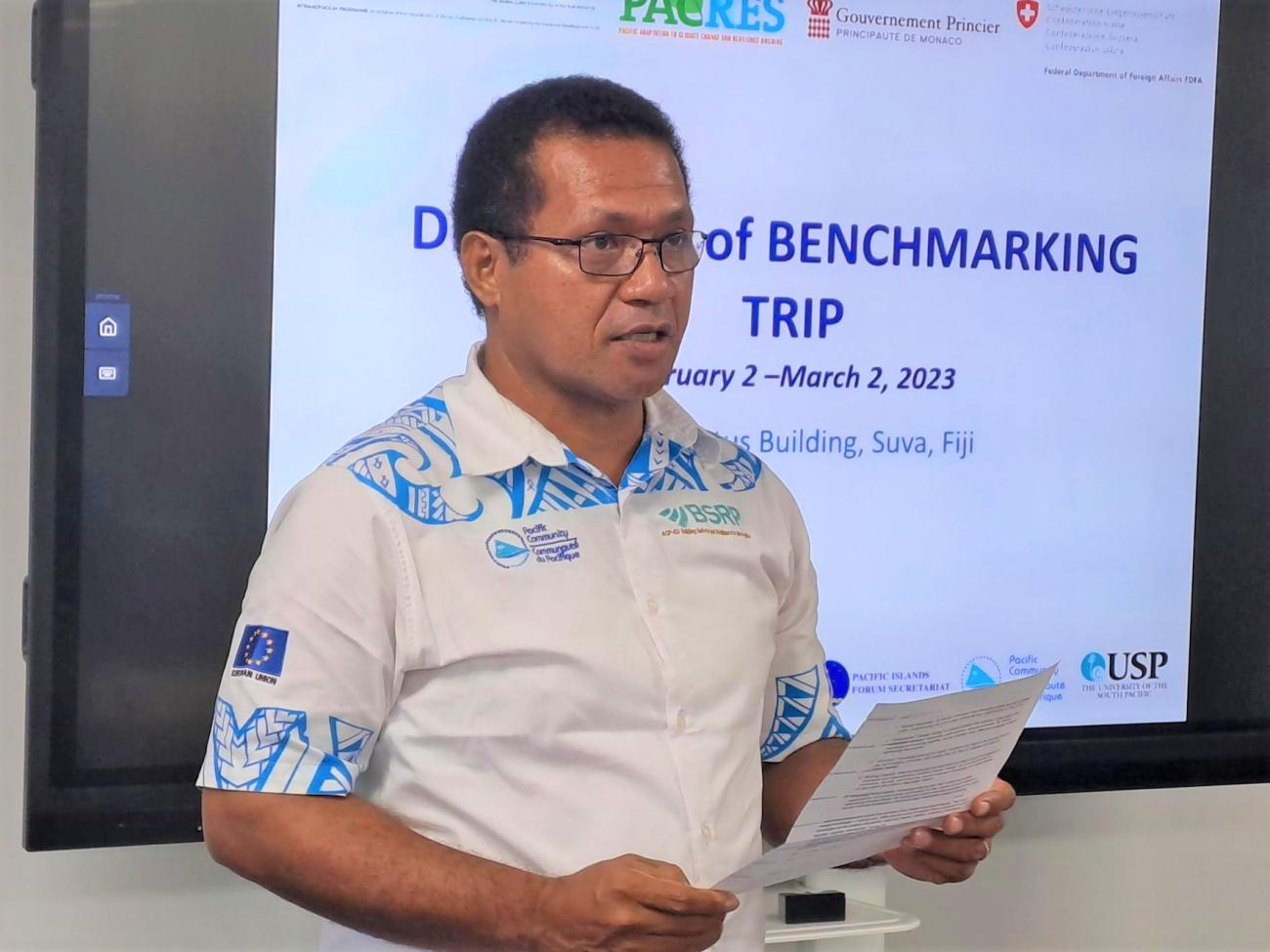TVET and sustainable practices to Climate-Resilient Communities (A benchmarking trip fostering TVET and sustainable practices to climate-resilient societies)
WELCOME ADDRESS BY AKUILA TAWAKE, SPC's Deputy Director, Georesources and Energy.
Bula Vinaka and welcome to the Pacific Community. We are happy to host you for the first-ever regional Benchmarking trip fostering TVET and sustainable practices to climate-resilient societies organised by SPC’s Pacific Adaptation to Climate Change and Resilience Building (PACRES).
The Pacific has a rich cultural heritage and history of adaptation and resilience, which is evident in the ways that its communities have coped with a range of challenges over time. For instance, Pacific Island communities have developed a range of traditional practices and knowledge systems that have enabled them to survive and thrive in challenging environments. If I went around the room and asked each of you to share on a traditional resilience practice, I am sure most of you would have some practices to share that has been passed down from your elders. That is the beauty of it all. Naturally, Pacific Islanders are resilient and that is how we have survived the changing climate.
However, the pace and scale of change in the region have accelerated in recent decades, and there is a growing need for Pacific communities to build greater resilience to cope with these challenges. You and I both have a hand to play to develop resilience practices in our homes, workplaces, institutions, and this ultimately impacts our communities and governing bodies. This includes investing in infrastructure and services that can withstand natural disasters and other shocks, as well as building stronger social networks and institutions that can support community resilience.
There are many examples of resilience-building initiatives in the Pacific, including community-based disaster risk reduction programs, efforts to strengthen local economies, and the development of climate-resilient infrastructure. There is also a growing recognition of the need to integrate traditional knowledge and practices into these initiatives, to ensure that they are culturally appropriate and effective.
The PACRES project under SPC's Geoscience, Energy and Maritime Division, has organised a benchmarking study tour for Resilience and TVET professionals from around the Pacific. That is why you are all here today.
You will be exposed to the different sectors important in building Pacific resilience, while also sharing on the best resilience practices from your own communities and professional backgrounds.
You will have the opportunity to visit projects and attend lectures on TVET and resilience related interventions while also fostering professional relationships with each other.
In terms of TVET, the PACRES project has had a hand in developing resilience in the TVET sector through the development of the regionally accredited Diplomas Level 5 and 6 in Resilience and the review of the Articulated Certificates in Resilience, Levels 2 and 4. Education is the driving force of resilience, and it is only when we are well informed on the best possible resilience practices, that we can effect change in our environment. That is the gist of this benchmarking study tour. To share knowledge and learn as much as we can from the activities set up for the week and most importantly from each others’ best practices.
Knowledge sharing on resilience is crucial so by sharing on your best resilience practices, you will be:
- Raising Awareness. By sharing information and educating others, we can increase public understanding and encourage individuals and organizations to take action.
- Collaboration: Climate change is a global problem that requires collaboration and cooperation between individuals, organizations, and governments. By sharing knowledge and working together, we can develop more effective strategies towards addressing the problem.
- Innovation: Knowledge sharing can spark innovation and lead to the development of new technologies, practices, and policies that can help to mitigate and adapt to climate change.
- Building Capacity: Sharing knowledge and expertise can help to build the capacity of individuals and organizations to address climate change. By providing access to information, training, and resources, we can empower individuals and organizations to take action and make a meaningful impact.
- Encourage Accountability: Knowledge sharing can help to hold individuals, organizations, and governments accountable for their actions or lack thereof in addressing climate change. By making information and data available to the public, we can increase transparency and encourage responsible decision-making.
I would like to end with a quote from authors Chris Collison and Geoff Parcell: “You can’t manage knowledge — nobody can. What you can do is to manage the environment in which knowledge can be created, discovered, capture
